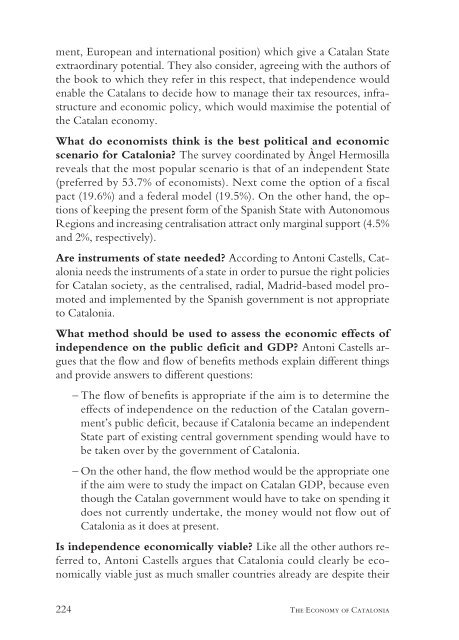The Economy of Catalonia
the_economy_of_catalonia._questions_and_answers_on_the_economic_impact_of_independence
the_economy_of_catalonia._questions_and_answers_on_the_economic_impact_of_independence
Create successful ePaper yourself
Turn your PDF publications into a flip-book with our unique Google optimized e-Paper software.
ment, European and international position) which give a Catalan State<br />
extraordinary potential. <strong>The</strong>y also consider, agreeing with the authors <strong>of</strong><br />
the book to which they refer in this respect, that independence would<br />
enable the Catalans to decide how to manage their tax resources, infrastructure<br />
and economic policy, which would maximise the potential <strong>of</strong><br />
the Catalan economy.<br />
What do economists think is the best political and economic<br />
scenario for <strong>Catalonia</strong>? <strong>The</strong> survey coordinated by Àngel Hermosilla<br />
reveals that the most popular scenario is that <strong>of</strong> an independent State<br />
(preferred by 53.7% <strong>of</strong> economists). Next come the option <strong>of</strong> a fiscal<br />
pact (19.6%) and a federal model (19.5%). On the other hand, the options<br />
<strong>of</strong> keeping the present form <strong>of</strong> the Spanish State with Autonomous<br />
Regions and increasing centralisation attract only marginal support (4.5%<br />
and 2%, respectively).<br />
Are instruments <strong>of</strong> state needed? According to Antoni Castells, <strong>Catalonia</strong><br />
needs the instruments <strong>of</strong> a state in order to pursue the right policies<br />
for Catalan society, as the centralised, radial, Madrid-based model promoted<br />
and implemented by the Spanish government is not appropriate<br />
to <strong>Catalonia</strong>.<br />
What method should be used to assess the economic effects <strong>of</strong><br />
independence on the public deficit and GDP? Antoni Castells argues<br />
that the flow and flow <strong>of</strong> benefits methods explain different things<br />
and provide answers to different questions:<br />
– <strong>The</strong> flow <strong>of</strong> benefits is appropriate if the aim is to determine the<br />
effects <strong>of</strong> independence on the reduction <strong>of</strong> the Catalan government’s<br />
public deficit, because if <strong>Catalonia</strong> became an independent<br />
State part <strong>of</strong> existing central government spending would have to<br />
be taken over by the government <strong>of</strong> <strong>Catalonia</strong>.<br />
– On the other hand, the flow method would be the appropriate one<br />
if the aim were to study the impact on Catalan GDP, because even<br />
though the Catalan government would have to take on spending it<br />
does not currently undertake, the money would not flow out <strong>of</strong><br />
<strong>Catalonia</strong> as it does at present.<br />
Is independence economically viable? Like all the other authors referred<br />
to, Antoni Castells argues that <strong>Catalonia</strong> could clearly be economically<br />
viable just as much smaller countries already are despite their<br />
224 <strong>The</strong> <strong>Economy</strong> <strong>of</strong> <strong>Catalonia</strong>


